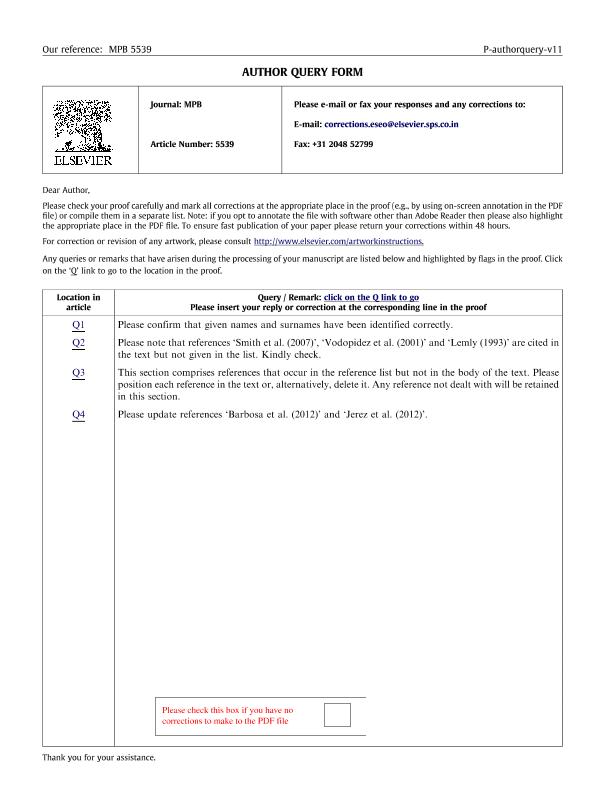Mostrar el registro sencillo del ítem
dc.contributor.author
Jerez, Silvia
dc.contributor.author
Motas, Miguel
dc.contributor.author
Benzal, Jesús
dc.contributor.author
Diaz, Julia Inés

dc.contributor.author
Barbosa, Andrés
dc.date.available
2017-01-12T22:02:10Z
dc.date.issued
2013-03
dc.identifier.citation
Jerez, Silvia; Motas, Miguel; Benzal, Jesús; Diaz, Julia Inés; Barbosa, Andrés; Monitoring trace elements in Antarctic penguin chicks from South Shetlands Islands, Antarctica; Elsevier; Marine Pollution Bulletin; 69; 1-2; 3-2013; 67-75
dc.identifier.issn
0025-326X
dc.identifier.uri
http://hdl.handle.net/11336/11273
dc.description.abstract
The concentration of human activities in the near-shore ecosystems from the northern Antarctic Peninsula area can cause an increasing bioavailability of pollutants for the vulnerable Antarctic biota. Penguin chicks can reflect this potential impact in the rookeries during the breeding season. They also can reflect biomagnification phenomena since they are on the top of the Antarctic food chain. The concentrations of Al, Cr, Mn, Fe, Ni, Cu, Zn, As, Se, Cd and Pb were measured by ICP-MS in samples of liver, kidney, muscle, bone, feather and stomach content of gentoo, chinstrap and Adélie penguin chicks (n = 15 individuals) collected opportunistically in the Islands of King George and Deception (South Shetland Islands, Antarctica). The detected levels of some trace elements were not as low as it could be expected in the isolated Antarctic region . Penguin chicks can be useful indicators of trace elements abundance in the study areas. Capsule: Carcasses of Antarctic penguin chicks were used to evaluate the 27 bioavailability of trace elements in the Islands of King George and Deception
dc.format
application/pdf
dc.language.iso
eng
dc.publisher
Elsevier

dc.rights
info:eu-repo/semantics/openAccess
dc.rights.uri
https://creativecommons.org/licenses/by-nc-nd/2.5/ar/
dc.subject
Metals
dc.subject
Trace Elements
dc.subject
Pollution
dc.subject
Antarctic Penguins Chicks
dc.subject
South Shetland Islands
dc.subject.classification
Conservación de la Biodiversidad

dc.subject.classification
Ciencias Biológicas

dc.subject.classification
CIENCIAS NATURALES Y EXACTAS

dc.title
Monitoring trace elements in Antarctic penguin chicks from South Shetlands Islands, Antarctica
dc.type
info:eu-repo/semantics/article
dc.type
info:ar-repo/semantics/artículo
dc.type
info:eu-repo/semantics/publishedVersion
dc.date.updated
2016-11-24T19:25:57Z
dc.journal.volume
69
dc.journal.number
1-2
dc.journal.pagination
67-75
dc.journal.pais
Países Bajos

dc.journal.ciudad
Amsterdam
dc.description.fil
Fil: Jerez, Silvia. Universidad de Murcia; España
dc.description.fil
Fil: Motas, Miguel. Universidad de Murcia; España
dc.description.fil
Fil: Benzal, Jesús. Consejo Superior de Investigaciones Cientificas. Estacion Experimental de Zonas Aridas; España
dc.description.fil
Fil: Diaz, Julia Inés. Consejo Nacional de Investigaciones Científicas y Técnicas. Centro Científico Tecnológico La Plata. Centro de Estudios Parasitológicos y de Vectores (i); Argentina. Universidad Nacional de La Plata; Argentina
dc.description.fil
Fil: Barbosa, Andrés. Consejo Superior de Investigaciones Cientificas. Estacion Experimental de Zonas Aridas; España. Museo Nacional de Ciencias Naturales; España
dc.journal.title
Marine Pollution Bulletin

dc.relation.alternativeid
info:eu-repo/semantics/altIdentifier/url/http://www.sciencedirect.com/science/article/pii/S0025326X13000064
dc.relation.alternativeid
info:eu-repo/semantics/altIdentifier/url/http://dx.doi.org/10.1016/j.marpolbul.2013.01.004
Archivos asociados
